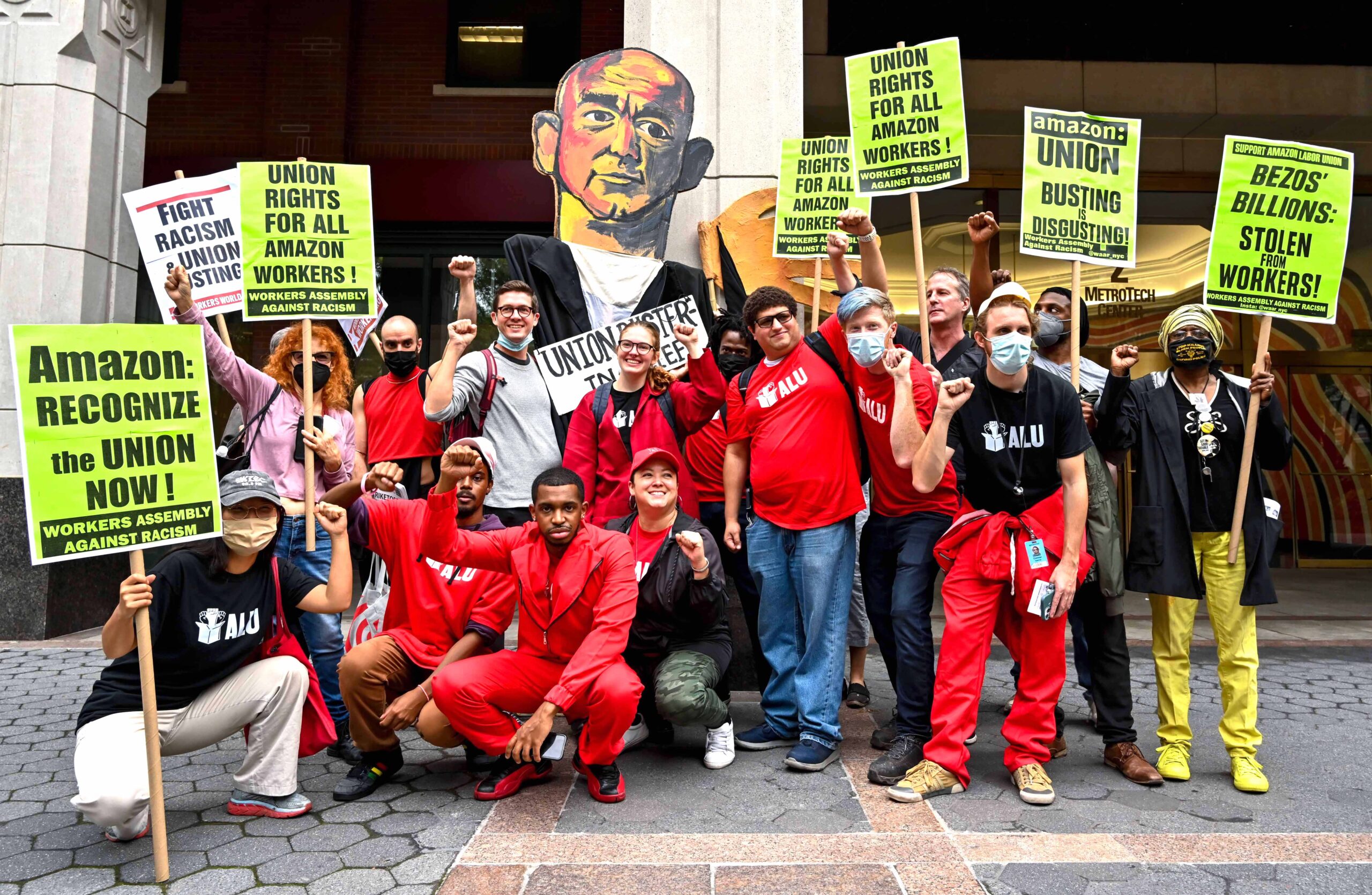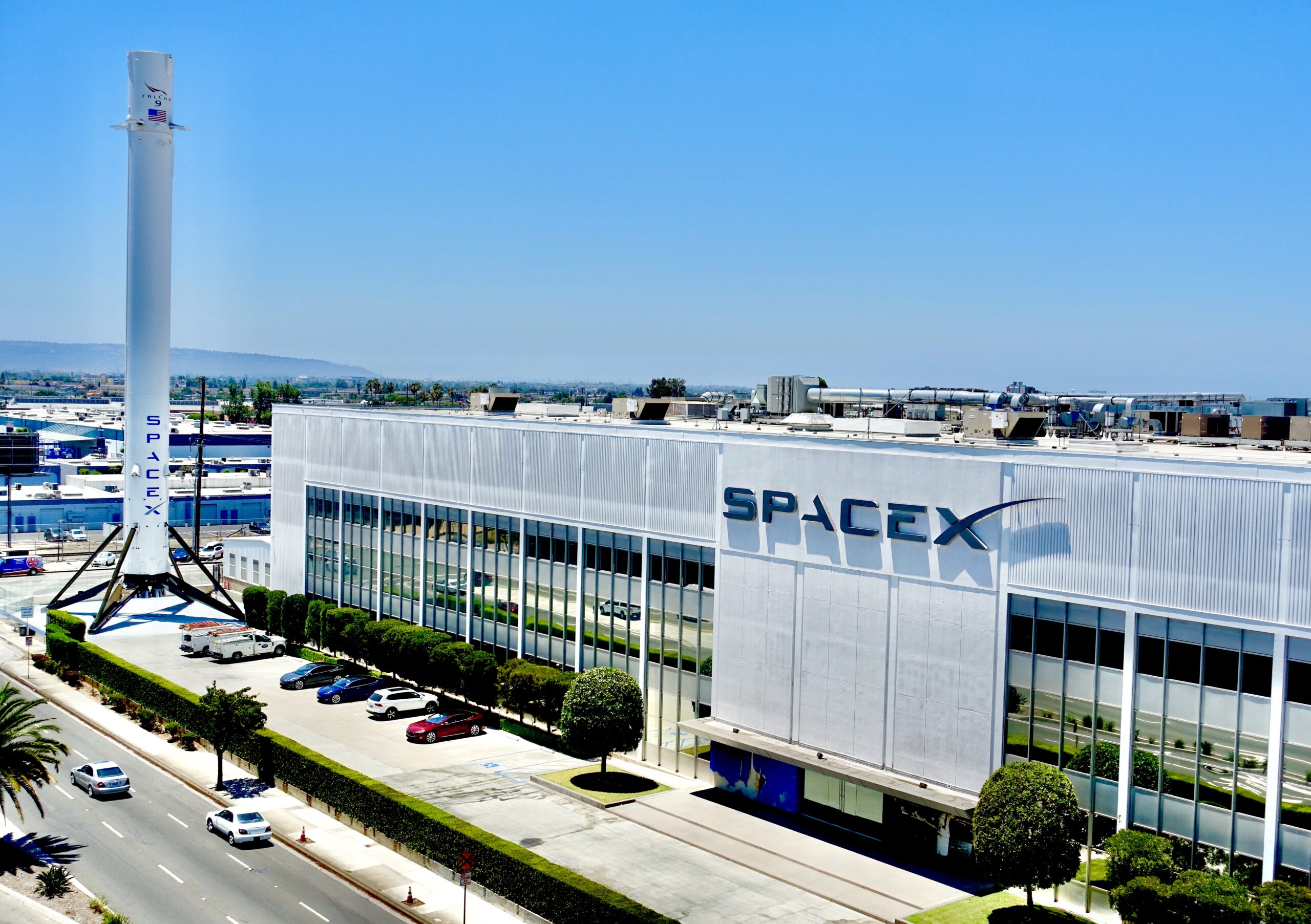NRLB Chief Counsel Jennifer Abruzzo fired back at corporate challenges against the labor board, saying they are designed to distract from the same companies’ law-breaking.

Amazon warehouse workers outside the National Labor Relations Board in New York, petitioning for authorization to hold a union vote, Oct. 25, 2021. (Joe Piette, Wikimedia Commons, CC BY-SA 2.0)
Amid an ongoing nationwide surge in union organizing across numerous industries in the U.S., powerful corporations in recent months have argued the federal watchdog tasked with ensuring fair labor practices is, itself, unconstitutional — but the nation’s top labor lawyer said Tuesday she doesn’t buy the claims of Amazon, Trader Joe’s and other companies.
The “deep-pocketed, low-road employers want to divert [the National Labor Relations Board’s] sparse resources to defending ourselves in court,” NLRB General Counsel Jennifer Abruzzo said at a virtual event, “to slow down or prevent us from engaging in concerted action. They’re just trying to stop our enforcement actions.”
Because it's worth seeing in full, here's what @NLRBGC had to say about SpaceX, Trader Joe's and Amazon ("deep-pocket, low-road employers") challenging the constitutionality of the NLRB. pic.twitter.com/gZ9Y3g8Qbv
— Dave Jamieson (@jamieson) April 9, 2024
Abruzzo spoke at a webinar titled “Preserving the Administrative State: Threats to Administrative Law Enforcement in the Courts,” hosted by the left-leaning think tank Roosevelt Institute. [Her comments begin at 3:08]
Watch the event below:
The event was held just over three months after SpaceX, billionaire enterpreneur Elon Musk’s space exploration company, filed a complaint against the NLRB after the board accused it of unlawfully firing eight employees.
SpaceX claimed that a “constitutionally required degree of control is lacking” at the agency because its judges and five board members cannot immediately be dismissed by a president.
In moves Abruzzo on Tuesday called “jumping on the bandwagon,” an attorney for Trader Joe’s argued at a hearing weeks later that the “structure and organization” of the NLRB is unconstitutional, and Amazon made a similar claim in February. Starbucks said in its own legal filing that the limitation on removing NLRB judges and members “frustrates the presidential control Article II [of the U.S. Constitution] demands.”
“These esoteric arguments came about why?” said Abruzzo.

Abruzzo at the Roosevelt Institute webinar. (Roosevelt Institute video still)
“Because we dared to issue a complaint against SpaceX after it unlawfully fired eight workers for speaking about their workplace concerns. And then Amazon jumps on the bandwagon, Starbucks jumps on the bandwagon, Trader Joe’s, others get in on the action just because we’re trying to hold them accountable for repeatedly violating workers rights to organize and collectively bargain through representatives of their free choosing.”
All the companies have been accused by the board’s prosecutors of violating labor law — a fact that Abruzzo said the corporations are eager for the public to forget.
A key goal of the legal filings is to “to divert attention away from the fact that they are actually lawbreakers who need to be held accountable in a timely manner,” Abruzzo said at the Roosevelt Institute webinar. “And frankly, that strategy is working. There’s a lot of public reporting about the challenges as opposed to the law-breaking.”

SpaceX headquarters at Hawthorne, California. (Steve Jurvetson, Wikimedia Commons, CC BY 2.0)
In addition to SpaceX’s alleged illegal firing of workers, the companies have been accused of retaliating against employees, limiting workers’ access to a warehouse, and closing store locations to discourage union activity, among other violations.
NLRB judges have already ruled against Starbucks, Amazon and Trader Joe’s in several workers’ rights cases.
Two of the companies — SpaceX and Amazon — were founded by the two richest men in the United States, Musk and Jeff Bezos.
“Once billionaires are scared of the power of the NLRB, they bring in the big guns,” Diana Reddy, a labor law professor at the University of California, Berkeley School of Law, said at the Roosevelt Institute event.
Abruzzo said courts are likely to reject the companies’ claims, noting the U.S. Supreme Court upheld the organizational structure of the NLRB in 1937.
Other federal agencies, including the Consumer Financial Protection Bureau and the Securities and Exchange Commission, have also been challenged as unconstitutional by corporate interests. Rulings in those cases are expecting in the coming months.
Julia Conley is a staff writer for Common Dreams.
This article is from Common Dreams.
Views expressed in this article and may or may not reflect those of Consortium News.

Chris Hedges has said many times, we have undergone a corporate coup d’etat. How are coups overturned? I think it begins with the letter “r”.
How rich does a person have to be? How much stuff do they need? How many houses, boats, cars, planes, servants, businesses and other trivialities do they need? How much money is enough? WE are ALL going to die and know that we can’t take it with us so really what is the point? And, how cruel do these millionaires and billionaires and maybe even trillionaires need to be? Are they simply being cruel because they can? Do they find joy in making others suffer? These people are not making this a better world, they are knowingly destroying it and laughing all the way to the bank…
It gets their dicks hard. Remember what John Huston’s character in “Chinatown” said when Nicholson’s character asked him those same questions. He said it was not about money. It was about power.
Of course, the key point about corporate America’s “legal tactics” are that they are legal. Thanks to the best democracy money can buy. Meanwhile “occupational deaths” continue to rise, with both corporate parties agreed that those police should stay de-funded.
This is rich!
These giant corporations are totalitarian institutions themselves. Top down tyrannical organizations.